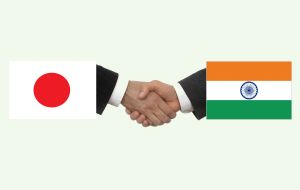
Remember that on April 28, 1952, India was one of the first countries to recognize the defeated Japan, sign a peace treaty and establish diplomatic relations with it. A year ago these countries, which now occupy 2nd and 3rd places economically in Asia, celebrated the 60th anniversary of this event, stressing their willingness to further strengthen bilateral political, economic and military-strategic relations.
Since August 2000, the strategic cooperation between the two countries has been developing particularly actively. Annual mutual visits of prime ministers have become a tradition. In October 2008, a bilateral Declaration on Security Cooperation was signed. It is noteworthy that India thus became the third country, after the United States and Australia, with which Tokyo is developing such cooperation, which includes regular meetings between the ministers of defense, holding joint exercises, and a close working relationship between the coast guard services, among other aspects.
Within the military partnership, Japan and India are striving to develop interoperability between the naval forces of the two countries so that they, as Japanese Prime Minister Shinzo Abe put it, “would be combined into a single harmonious system”.
In addition, both countries are actively strengthening joint defense and cooperation in the field of technology needed for overall defense capability. The Japanese Government’s December 2011 decision to partly lift weapons export restrictions allows industrial cooperation in the field of individual projects to develop significantly. As “Jane’s Defence Weekly” journal calculated, the benefit to India in matters of defense policy for the period from 2011 to 2015 could reach the astronomical sum of $100 billion.
A very important step in strengthening bilateral relations was the introduction of the 2 +2 mechanism for strategic cooperation (involving the ministers of foreign affairs and defense), and regular meetings of senior staff of these ministries. The rapprochement of the two countries has also been aided to a large extent by a policy initiated by Indian Prime Minister Manmohan Singh, focused on the development of relations with the countries of East Asia (“Look East Policy”). This convergence acquired particular significance when India and Japan joined together with Brazil and Germany to form the G 4 – a union of four countries wishing to obtain a permanent seat on the UN Security Council.
Another factor that has contributed to the development of strategic cooperation between the two countries is the free trade agreement CEPA (Comprehensive Economic Partnership Agreement), which was signed in February 2011 and entered into force in August 2012. This agreement will allow for bilateral trade to reach $25 billion by 2014, up from $4 billion in 2002 and $15 billion in 2011.
In recent years, the two countries have also begun to actively develop ties in the nuclear field. India is interested in Japanese civil nuclear technology and plans to build 18 nuclear power plants by 2020, counting on Japanese companies to assist in this endeavour. At present, negotiations are actively proceeding to conclude an agreement between the two countries on cooperation in peaceful uses of nuclear energy and joint action in the field of nuclear safety. Given the fact that India has not joined the Treaty on Non-Proliferation of Nuclear Weapons, has not stopped its nuclear testing program and possesses nuclear weapons, the prospects for further cooperation between the two countries in nuclear energy depend to a large extent on India soon signing and ratifying the Comprehensive Nuclear Test Ban Treaty.
This May’s official visit to Tokyo by Prime Minister Manmohan Singh and his talks with Japanese counterpart Shinzo Abe provide additional evidence of further bilateral strategic cooperation between Japan and India in the context of the increasingly complicated situation developing in the Asia-Pacific region in recent times.
Vladimir Odintsov, political analyst, exclusively for the online magazine “New Eastern Outlook”.
